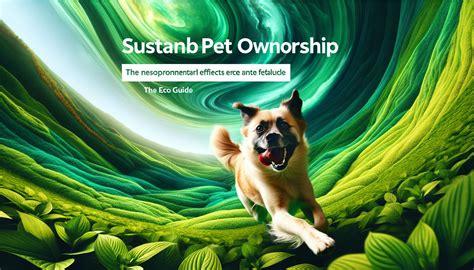In 2023, the global pet care industry was valued at an astounding USD 232 billion. As the demand for companion animals continues to surge, it is imperative that we adopt sustainable practices to ensure their well-being while minimizing our environmental footprint.

1. Responsible Pet Acquisition
-
Adopt, Don’t Shop: Over 3 million pets are euthanized in U.S. animal shelters annually due to lack of adoption. This practice contributes to overcrowding, stress, and unnecessary animal suffering.
-
Choose Sustainable Breeds: Research different breeds and consider their size, energy levels, and health issues. Smaller breeds and breeds with shorter lifespans generally consume less resources and produce less waste.
2. Nutrition and Waste Management
-
Eco-Friendly Food: Opt for pet food that is sustainably sourced, contains locally produced ingredients, and uses recyclable packaging.
-
Compostable Waste: Train your pets to use biodegradable poop bags made from plant-based materials. Dispose of pet waste responsibly to prevent soil and water contamination.
3. Environmental Enrichment
-
Natural Toys: Provide your pets with toys made from sustainable materials, such as wood, bamboo, and recycled plastic. This reduces plastic pollution and provides mental stimulation.
-
Outdoor Exploration: Allow your pets to safely explore natural areas, where they can engage in natural behaviors and connect with their instincts.
4. Health and Wellness
-
Preventive Care: Regular veterinary check-ups, vaccinations, and parasite control help prevent diseases and extend pet lifespans, reducing resource consumption and environmental impact.
-
Natural Remedies: Consider holistic or homeopathic remedies for minor ailments, which can reduce the use of chemical medications and their potential side effects.
5. End-of-Life Considerations
-
Eco-Friendly Burial: Opt for natural burials in biodegradable pet caskets made from bamboo, willow, or cardboard. This minimizes environmental pollution and allows for a respectful farewell.
-
Memorial Trees: Plant a tree in memory of your beloved pet, creating a lasting tribute while benefiting the environment through oxygen production and carbon sequestration.
Sustainable Pet Ownership VS. Traditional Practices
| Feature | Sustainable Pet Ownership | Traditional Practices |
|---|---|---|
| Pet Acquisition | Adopt or choose sustainable breeds | Purchase from breeders or pet stores |
| Nutrition | Eco-friendly food, compostable waste | Conventional pet food, plastic waste |
| Environmental Enrichment | Natural toys, outdoor exploration | Plastic toys, limited outdoor access |
| Health and Wellness | Preventive care, natural remedies | Reactive treatment, chemical medications |
| End-of-Life Considerations | Eco-friendly burial, memorial trees | Traditional burial, no memorial |
Motivations for Sustainable Pet Ownership
-
Environmental Conservation: Reducing resource consumption, minimizing waste, and preserving natural habitats.
-
Animal Welfare: Ensuring the well-being of companion animals by providing a healthy and eco-friendly environment.
-
Personal Fulfillment: Finding joy and purpose in caring for pets while contributing to sustainability.
Common Mistakes to Avoid
-
Overfeeding: Excess food intake can lead to obesity, health issues, and increased waste production.
-
Inappropriate Disposal of Pet Waste: Leaving pet waste on the ground pollutes waterways and poses health risks.
-
Use of Harmful Materials: Avoid pet products made with toxic materials that can harm pets and the environment.
Case Detail: Reducing Plastic Waste
The pet care industry generates a significant amount of plastic waste through packaging, toys, and other products. By adopting sustainable practices, pet owners can reduce their plastic footprint.
-
Case Study: A study by the University of California, Berkeley found that by switching to compostable poop bags, pet owners could reduce their plastic waste by up to 50%.
-
Call to Action: Choose biodegradable and recyclable pet products, and advocate for eco-friendly practices in the industry.
FAQs on Sustainable Pet Ownership
-
What are the benefits of adopting a pet from a shelter?
* Reduces overcrowding and euthanasia rates.
* Provides a loving home for an animal in need.
* Supports local animal welfare organizations. -
Are there any drawbacks to adopting a pet from a shelter?
* Some pets may have health or behavioral issues.
* The adoption process can be competitive.
* May not have the specific breed or age desired. -
What is the best way to prevent pet obesity?
* Monitor food intake and follow veterinarian’s feeding recommendations.
* Provide regular exercise and enrichment opportunities.
* Avoid feeding table scraps or excessive treats. -
Why is it important to dispose of pet waste responsibly?
* Prevents contamination of waterways and groundwater.
* Protects human and animal health from parasites and bacteria.
* Reduces odors and visual pollution. -
What are some natural ways to treat minor pet ailments?
* Use herbal remedies such as chamomile for calming and lavender for anxiety.
* Apply essential oils like tea tree oil for antibacterial and antifungal properties.
* Consult a holistic veterinarian for personalized recommendations. -
What should I consider when planning for my pet’s end-of-life?
* Discuss end-of-life care options with your veterinarian.
* Make arrangements for burial or cremation.
* Create a memorial to honor your pet’s life. -
How can I advocate for sustainable pet practices?
* Support businesses that offer eco-friendly pet products.
* Share information about sustainable pet ownership with friends and family.
* Participate in community clean-ups and other environmental initiatives. -
What are the future trends in sustainable pet ownership?
* Increased adoption rates and responsible breeding practices.
* Development of plant-based pet food and biodegradable pet products.
* Use of technology to track pet health and manage environmental impact.
Conclusion
Sustainable pet ownership is an ethical and responsible approach to companion animal care that minimizes environmental impact and promotes the well-being of pets. By adopting sustainable practices, we can create a brighter future for both animals and the planet. Remember, every choice we make, from pet acquisition to end-of-life considerations, can contribute to a more sustainable world for all.





















